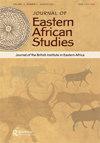Mother Earth is for us all: the discontent of Oromo pottery-making women at land dispossession in Southwest Oromia, Ethiopia
IF 0.6
3区 社会学
Q2 AREA STUDIES
引用次数: 0
Abstract
ABSTRACT This paper examines the effects of changes in land tenure on female potters in the southern highlands of Ethiopia. Communal land has historically played an important role in the livelihoods of pottery-making women, who rely on the non-agricultural use of this land. Data was gathered through interviews and observations, and the resulting evidence was organized and analyzed to address the research objectives and contextualize the findings within a broader empirical framework. Recent changes to Ethiopia’s communal land tenure system have disproportionally affected the socio-economy of the pottery-making women in comparison to their non-pottery-making counterparts by constraining their access to clay mining sites. Meanwhile, globalization and the free-market economy have facilitated the unrestricted import and distribution of plastic and metal objects, significantly reducing the need for pottery objects, and further impacting the potters’ livelihoods and social status. The fact that globalization and government changes to the communal land tenure system have disproportionally affected artisan women in Ethiopia resonates with the need for academia to pay more attention to intersectionality when studying gender bias, given that the situation has created an additional level of discrimination for socially marginalized women.地球母亲是我们大家的:埃塞俄比亚西南奥罗米亚奥罗莫制陶妇女对土地被剥夺的不满
摘要 本文探讨了土地使用权的变化对埃塞俄比亚南部高地女陶工的影响。公有土地历来在制陶妇女的生计中发挥着重要作用,她们依赖于对土地的非农业利用。研究人员通过访谈和观察收集数据,并对所得证据进行整理和分析,以实现研究目标,并在更广泛的实证框架内对研究结果进行背景分析。埃塞俄比亚的公有土地使用权制度最近发生了变化,限制了制陶妇女进入粘土矿地的机会,从而对她们的社会经济造成了与非制陶妇女相比不成比例的影响。同时,全球化和自由市场经济促进了塑料和金属制品的无限制进口和销售,大大减少了对陶器的需求,进一步影响了陶艺家的生计和社会地位。全球化和政府对公有土地使用权制度的改变对埃塞俄比亚手工艺妇女的影响尤为严重,这一事实引起了学术界的共鸣,即在研究性别偏见时需要更多地关注交叉性,因为这种情况对社会边缘化妇女造成了额外的歧视。
本文章由计算机程序翻译,如有差异,请以英文原文为准。
求助全文
约1分钟内获得全文
求助全文
来源期刊

Journal of Eastern African Studies
AREA STUDIES-
CiteScore
3.30
自引率
7.10%
发文量
12
期刊介绍:
Journal of Eastern African Studies is an international publication of the British Institute in Eastern Africa, published four times each year. It aims to promote fresh scholarly enquiry on the region from within the humanities and the social sciences, and to encourage work that communicates across disciplinary boundaries. It seeks to foster inter-disciplinary analysis, strong comparative perspectives, and research employing the most significant theoretical or methodological approaches for the region.
 求助内容:
求助内容: 应助结果提醒方式:
应助结果提醒方式:


